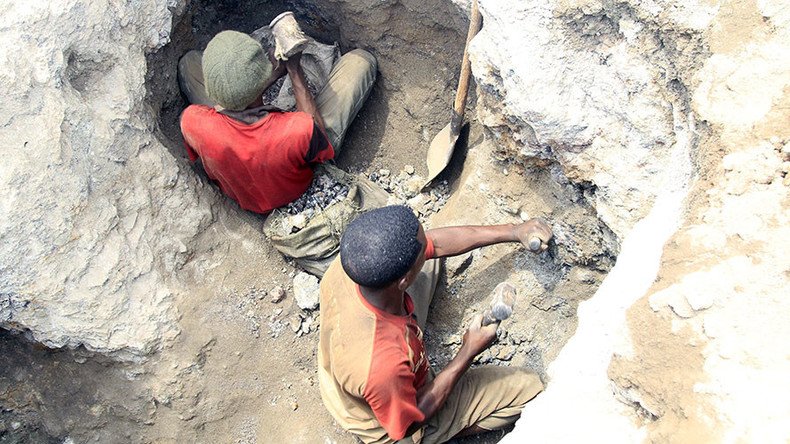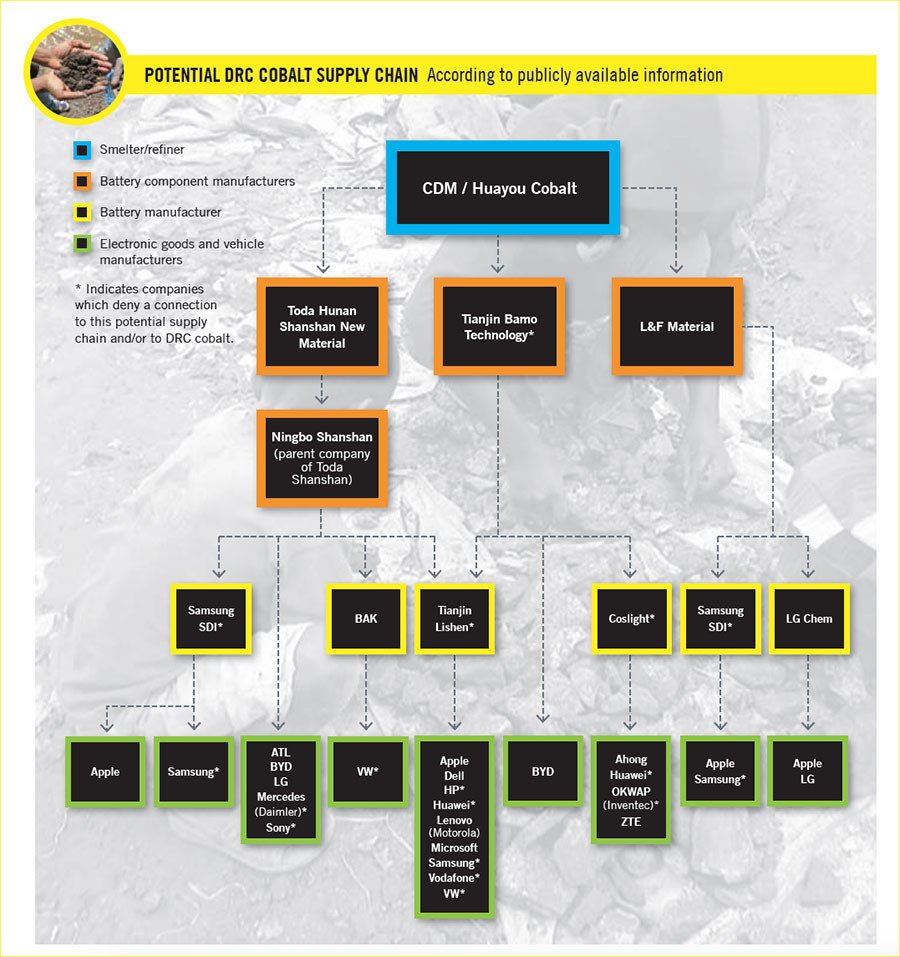Apple, Microsoft allegedly use cobalt sourced from child labor in DR Congo – Amnesty

Amnesty International is calling out major tech manufacturers – including Apple, Microsoft, Sony and others for their alleged links to illegally-sourced cobalt in the volatile Democratic Republic of Congo (DRC).
Children are forced to work in subhuman conditions and under constant threat of violence.
The organization says the mineral used in household appliances the world over is largely sourced from child labor that goes on deep inside hazardous mines and tunnels.
The product of this labor then finds its way into batteries and other components of leading brands – from Microsoft to Apple, and Nokia and Samsung to Vodafone. But tracing the supply chain is a tough task, and it has never been the case that a company would simply reveal it. In certain cases, no one wants to know.
But as Amnesty and Afrewatch found out, there are cases when companies simply lie about sourcing any materials from the DRC at all.
Globally, the demand for household electronic equipment is only rising, and cobalt is the key component in the lithium-ion rechargeable batteries used in such appliances.
The report documents these inhumane and illegal conditions and seeks to examine how cobalt then makes its way to the global market.
It was found that the precious mineral was making its way into the products of 16 major multinationals.
Meanwhile, the adults and children working the mines continue to be paid a dollar a day and face not only health hazards, but also the ugliness of DRC’s political situation, marked by daily violence, extortion and intimidation.
The report by Amnesty is the first comprehensive account of cobalt’s journey from the dark pits of the Democratic Republic of the Congo, formerly Zaire, into our laptops, mobiles and other devices.
To arrive at their conclusions, Amnesty International and Afrewatch visited five mines in DRC in April and May 2015. They interviewed 90 workers, 17 of them children.
According to Amnesty, “more than half of the world’s total supply of cobalt comes from the [DRC]. According to the government’s own estimates, 20 percent of the cobalt currently exported from the DRC comes from artisanal miners in the southern parts of the country.
“There are approximately 110,000 to 150,000 artisanal miners in this region, who work alongside much larger industrial operations.”

These miners work in the worst conditions imaginable, for 12 hours a day. There are the potentially fatal effects of exposure to cobalt. And without the most basic protective equipment, the risk increases.
Furthermore, the miners, “referred to as ‘creuseurs’ in the DRC, mine by hand using the most basic tools to dig out rocks from the tunnels deep underground,” the report notes. “Artisanal miners include children as young as seven who scavenge for rocks containing cobalt in the discarded by-products of industrial mines, and who wash and sort the ore before it is sold.”
All of this adds up to huge loads for the children to shoulder. Several complained of having been beaten by guards employed by the mining companies. Workers were also forced into paying “fines” by unauthorized police, employed by government officials to intimidate the miners and extort money.
The mines visited by Amnesty and Afrewatch appear to all be sending their produce to Congo Dongfang Mining (CDM) and a subsidiary of China’s mineral company Zhejian Huayou Cobalt Ltd. The first of these is among the largest mineral processors in the DRC.
According to the authors, Huayou Cobalt’s appetite amounts to some 40 percent of all cobalt in the DRC. The company was also found to process the mineral before it being sent off to tech manufacturers. But when asked to comment, it wrote that “our company has not been aware that any of our legitimate suppliers has hired child labor in their mining sites or operated in unsafe working conditions… CDM has rigorously selected its ore suppliers to ensure the procurement of raw materials through legitimate channels.”
When Amnesty approached the multinational brands for comment on their business with CDM, two of them flat-out denied that they source their materials from the DRC, while five said they had no links to the Chinese mineral processor. The remaining companies either conceded, or said they had launched investigations.
“Underage labor is not tolerated in our supply chain and we are proud to have led the industry in pioneering new safeguards,” said Apple – one of those that are allegedly investigating the claims. Vodafone said it was “unaware.”
Amnesty believes the issue is that none of these companies can actually verify where the cobalt comes from. But “around half of all cobalt comes from the DRC, and no company can validly claim that they are unaware of the human rights and child labor abuses linked with mineral extraction in the region,” business and human rights researcher at Amnesty International, Mark Dummett, told the Guardian.
He added that there is simply no excuse for not investing in technology that would allow the companies to determine their supply chains.














